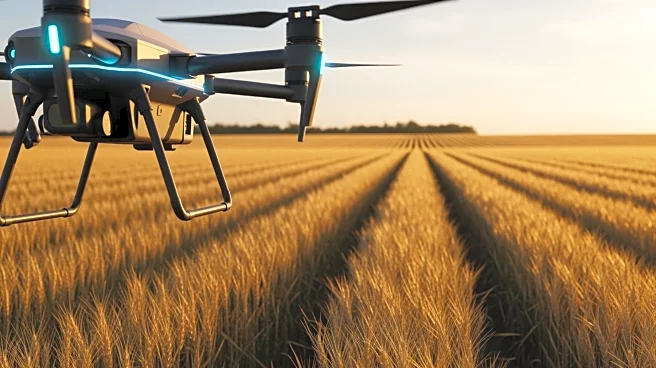What's Happening?
North Dakota's Grand Farm has been awarded $7 million in state funding to advance research in autonomous agriculture technologies. The funding, provided through the state's Commerce Department's Autonomous
Agriculture Grant Program, aims to enhance the facilities and infrastructure at the research campus located west of Casselton. The initiative focuses on developing technologies such as robotics, artificial intelligence, and drones to improve farming efficiency and sustainability. Greg Tehven, chair of the Grand Farm board, emphasized the importance of this investment in increasing the capacity for technology testing and fostering collaboration between public and private sectors. The funding is part of a broader effort by the state to maintain its leadership in agricultural innovation.
Why It's Important?
The investment in Grand Farm is significant as it positions North Dakota at the forefront of agricultural technology development. By supporting research in autonomous farming, the state is addressing critical challenges such as labor shortages and environmental sustainability. The use of robotics and AI in agriculture can lead to more efficient farming practices, reducing reliance on herbicides and improving crop yields. This funding not only benefits local farmers but also attracts industry partners and investments, potentially boosting the state's economy. As agriculture remains a vital sector in North Dakota, advancements in technology could ensure long-term viability and competitiveness in the global market.
What's Next?
With the new funding, Grand Farm plans to expand its research capabilities and attract more industry partners. The next phase of development will focus on building additional infrastructure to support deeper research activities. This could lead to more applications of AI solutions in farming, enhancing efficiency and safety for producers. The state is likely to continue investing in similar initiatives to maintain its leadership in agricultural innovation. Stakeholders, including farmers and technology companies, are expected to engage more actively in collaborative projects, driving further advancements in autonomous agriculture.
Beyond the Headlines
The development of autonomous agriculture technologies at Grand Farm could have broader implications for rural communities in North Dakota. By reducing the need for manual labor, these technologies could address workforce challenges and improve the quality of life for farmers. Additionally, the focus on sustainable practices aligns with global efforts to combat climate change, positioning North Dakota as a leader in environmentally responsible agriculture. The collaboration between public and private sectors may also foster innovation beyond agriculture, potentially influencing other industries in the state.











